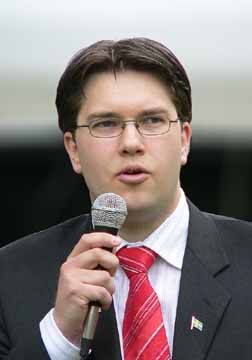 Sweden’s ruling centre-right coalition won the most votes but fell short of a majority in the general election as the far right entered parliament for the first time.
Sweden’s ruling centre-right coalition won the most votes but fell short of a majority in the general election as the far right entered parliament for the first time.
Prime Minister Fredrik Reinfeldt’s Alliance won 49.2 percent of votes and 172 seats in Sweden’s 349-seat legislature in Sunday’s vote, three short of a majority, according to a final ballot count. The leftwing opposition coalition garnered 43.7 percent of the ballot and 157 seats, marking a crushing defeat for Social Democrat Mona Sahlin, 53. “We have received broad support tonight,” Reinfeldt told a jubilant crowd in Stockhom, boasting that his Moderate party had seen its voter support double from 15 percent in 2002 to 30 percent on Sunday. Yet, he acknowledged, “this is not the election result we had hoped for,” lamenting the anti-immigrant far-right Sweden Democrats’ entry into parliament with 5.7 percent of the vote, and 20 seats in the house.
Observers have cautioned the far-right party could play either kingmaker or spoiler, forcing Reinfeldt to seek new alliances or even make it so difficult to govern that snap polls are forced.
“I have been clear…. We will not cooperate with or be made dependent on the Sweden Democrats,” Reinfeldt, 45, said in his victory speech, adding that he would seek to shore up support from elsewhere.
“I will turn to the Greens to get broader support in parliament,” he said.
The Green Party, which campaigned as part of a “red-green” opposition coalition with the Social Democrats and formerly communist Left Party and which scored its best election result ever with 7.2 percent of the vote, however rejected the idea outright.
“It would be very difficult for us after this campaign to look our voters in the eyes and say we have agreed to cooperate with this government,” party co-chairwoman Maria Wetterstrand told Swedish public television.
Social Democrat Sahlin, who had been vying to become Sweden’s first woman prime minister, meanwhile warned that the far-right’s rise had put Sweden in a “dangerous political situation.”
“It is now up to Fredrick Reinfeldt how he plans to rule Sweden without letting the Sweden Democrats get political influence,” she told a crowd of crestfallen supporters after acknowledging defeat.
Reinfeldt’s win spelled a decisive end to the rival Social Democrats’ 80-year domination of Swedish politics and their role as caretakers of the country’s famous cradle-to-grave welfare state.
The party, which for the first time had created a coalition of leftwing parties to increase its chances of winning power, suffered a historic loss, winning just 30.9 percent of the vote, down from 35.3 percent in 2006, when its score was already one of its weakest on record.
It is still the most popular single party, although it is now less than a percentage point ahead of Reinfeldt’s Moderates. In 2002, 15 points separated the two parties.
More than 82 percent of Sweden’s seven million electorate had cast their ballots Sunday, the final tally of votes from all election districts showed, although the number could shift slightly, since votes from abroad will be counted until Wednesday.
The far-right was celebrating its historic entry in parliament.
Now we are in the Riksdag! We are in!,” exulted Jimmie Aakesson, the 31-year-old leader of the Swedish far-right, as he addressed supporters at the party’s election headquarters.
He dismissed widespread fears his party would cause parliamentary chaos.
“We won’t cause problems. We will take responsibility. That is my promise to the Swedish people,” he said.
Aakesson recalled a tough election campaign, saying his party had been excluded from the public debate.
“We were exposed to censorship, we were exposed to a medieval boycott, they… excluded us,” he lamented.
However, “today we have written political history,” he said.
The party wants to put the brakes on immigration in Sweden, where more than 100,000 foreigners take up residence every year.
The Sweden Democrats won 0.37 percent of the ballot in 1998 and garnered 2.9 percent of the vote in legislative elections in 2006.
Link: http://uk.news.yahoo.com/18/20100920/twl-sweden-coalition...
***
Un altro segnale per l’Europa
L’estrema destra nel Parlamento svedese
Jimmie Akesson (Reuters)
La Svezia ha votato. E ora sta sospesa nel vuoto. Come metà del resto d’Europa. Con diversi acrobati a scrutarsi, da una rete all’altra; e con molti trapezi che pendono a destra rendendo più difficile l’insieme delle esibizioni. Fuor di metafora: molte nuove formazioni di destra o estrema destra sono comparse nel circo politico europeo, favorite probabilmente dai malesseri sociali della crisi, hanno conquistato posizioni di spicco nelle elezioni e sono divenute decisive per la formazione dei governi.
Forse è presto per parlare di una marea montante. Ma certo, l’onda c’è e si vede. In Svezia, ieri, con lo stallo fra centrodestra e centrosinistra incapaci di governare da soli, a far da ago della bilancia sono rimasti i Democratici svedesi, gruppo di estrema destra che chiede solidarietà per l’Eurabia violentata dall’Islam, e propugna la cacciata di tutti gli immigrati extracomunitari a meno che non accettino «l’assimilazione culturale». Per la prima volta, guidati dal loro giovane capo Jimmie Akesson, hanno superato lo sbarramento del 4% dei voti che chiude l’accesso al Parlamento.

Nella vicina Finlandia, salgono nei sondaggi i «True Finns» («Veri finlandesi») che propugnano il «rispetto delle tradizioni silvane». Sembrano raccontar fole, ma in tre anni hanno raddoppiato i voti. In Danimarca, il Partito del popolo si è reso famoso per aver diffuso le vignette satiriche su Maometto e da allora ha allargato le campagne a molti altri temi. In Olanda, il Partito della libertà di Geert Wilders ha 24 seggi in Parlamento, e collegamenti sempre più stretti con i colleghi del vicino Belgio: i fiamminghi ultranazionalisti del Vlaams Belang, anch’essi in crescita. E così via: dall’Ungheria, con i nazionalisti di Jobbik in fortissima crescita, alla Romania con quelli di Grande Romania. Tutti costoro si riuniranno a fine ottobre ad Amsterdam, insieme con i club ultras del calcio di tutta l’Europa, per acclamare Geert Wilders.
Luigi Offeddu
***
Exit-poll in Svezia, vince il centrodestra
E gli estremisti entrano in Parlamento
Il partito xenofobo Democratici di Svezia oltre il 5%
STOCCOLMA – Con il passare delle ore, i dati dello spoglio confermano che a vincere in Svezia è stata la coalizione di centrodestra guidata dal primo ministro svedese Frederik Reinfeldt, che non è riuscita però a raggiungere la maggioranza necessaria a formare da sola un nuovo governo. L’ago della bilancia è quindi l’estrema destra di Jimmi Akesson, i Democratici di Svezia, che può contare sul 6,2% dei voti. E avendo superato la soglia di sbarramento del 4%, per la prima volta fa il suo ingresso in parlamento. L’Alleanza di quattro partiti guidata da Reinfeldt ha ottenuto un secondo mandato, un’altra prima assoluta in un secolo di storia del Paese scandinavo, in cui i socialdemocratici hanno dominato la scena politica per 80 anni. Secondo lo scrutinio di circa la metà delle circoscrizioni elettorale, inoltre, l’Alleanza di governo del premier uscente Fredrik Reinfeldt ha ottenuto il 48,8% dei suffragi contro il 43,7% della coalizione di centrosinistra della socialdemocratica Mona Sahlin. La maggioranza della coalizione di governo rischia però di non avere i numeri per formare il nuovo governo: secondo alcuni, avrebbe raggiunto la maggioranza assoluta grazie a un solo seggio (175 su 349), per altri si fermerebbe a 172 seggi. Tra i 20 e i 21 seggi per l’estrema destra, a questo punto decisivi, mentre il centrosinistra si aggira tra i 154 e i 156.
CENTROSINISTRA SCONFITTO – Sconfitto il centrosinistra, che puntava su una donna, Mona Sahlin, per recuperare il primato perduto quattro anni fa e che si è fermato al 45,1% dei suffragi. L’estrema destra di Akesson, 31 anni, da cinque leader di Sd, è da tempo presente negli enti locali e si ritrova dunque a fare da ago della bilancia, nonostante negli ultimi giorni di campagna elettorale sia Reinfeldt che Sahlin hanno categoricamente escluso una collaborazione con il partito xenofobo e anti-islamico. «Non li toccherei neanche con le pinze», aveva detto nei giorni scorsi il premier uscente, mentre Akesson aveva tuonato contro gli altri partiti, prevedendo la storica svolta: «Per il semplice fatto di trovarci in parlamento, li spaventeremo e li costringeremo ad adattarsi». In un Paese che ha fatto registrare una ripresa economica tra le più forti in Europa e uno stato delle finanze pubbliche tra i più sani, la campagna elettorale è stata dominata dai temi del welfare e delle politiche fiscali, con il governo che ha rivendicato i tagli alle tasse e ai benefit e l’opposizione che al contrario ha criticato l’indebolimento del celebre stato sociale svedese, dalla culla alla tomba. E il welfare, «corroso» dall’immigrazione, è stato anche il cavallo di battaglia della destra che ha cavalcato (come successo in altri Paesi europei, dal Belgio all’Olanda) le paure di un Paese composto per il 14% da stranieri di varie nazionalità, brandendo la minaccia di una «rivoluzione islamica».

IL LEADER NAZIONALISTA – Trentuno anni, capelli scuri, occhiali e abbigliamento all’ultima moda. Il leader dell’estrema destra in Svezia non è un vichingo biondo, ma il giovane rampante Jimmi Akesson, classe 1979, da cinque anni alla guida dei Democratici di Svezia (Sd). Militante dall’età di 15 anni, Akesson fu scelto nel 2005 per essere la figura di punta di un partito quasi inesistente alle elezioni precedenti. Alle legislative del 1998, Sd aveva raccolto solo lo 0,37% dei voti, poi l’1,44% nel 2002. Ma nel 2006, sotto la guida di Akesson, l’estrema destra ha raggiunto il 2,93% e oggi ha superato la soglia del 4% (al 4,6%, secondo gli exit poll) necessaria a conquistare seggi in Parlamento. Con il suo look rassicurante, Akesson ha modificato la percezione che gli svedesi avevano dell’estrema destra, attenuando nettamente l’ombra del movimento Bevara Sverige Svenskt (Manteniamo la Svezia svedese) da cui gli Sd sono usciti. Nel 1995, quando quindicenne entrò nel partito, c’erano ancora militanti vestiti in uniforme nazista: «Oggi siamo diversi – ha detto in una recente intervista il giovane leader – e gli elettori lo vedono». Ma Akesson, nato a Solvesborg (nel sud della Svezia) dove è consigliere comunale dal 1998, non ha dimenticato i temi fondamentali del suo partito: l’immigrazione, la criminalità e i legami tra le due. «Tutti gli immigrati non sono dei criminali, certo, ma c’è una connessione», ha detto, rivendicando un «punto di vista conservatore» e sottolineando come le politiche in merito a immigrazione e criminalità siano «ciò che ci differenzia dagli altri partiti». Secondo osservatori e oppositori, però, i Democratici di Svezia, pur non essendo nazisti, continuano a essere razzisti. Secondo Anders Hellstrom, esperto di neonazionalismo in Scandinavia, Akesson è solo la parte visibile del partito, mentre la direzione ideologica di Sd sarebbe affidata da «una banda di quattro: Akesson, Jomshof, Karlsson e Soder» (quest’ultimo è segretario del partito), i quali tentano di trovare una via «tra l’estremismo e il populismo». «Si potrebbe dire – ha aggiunto l’esperto – che cerchino di spingere più in là i limiti del legittimo, in equilibrio sul filo dell’accettabile».
Redazione CDS online
***
Minority Rules
Foreign Policy
Paul O’Mahony
September 16, 2010
If the spectrum of political stereotypes about Sweden ranges from IKEA-furnished socialist paradise to Stieg Larsson-style right-wing dystopia, the country’s upcoming election on September 19 seems far more likely to confirm the latter than the former. The Sweden Democrats, a once-marginal populist party whose platform targets immigrants, is on the path to enter parliament for the first time — and potentially to serve as kingmaker in post-election coalition negotiations.
“Stieg would have been appalled but not surprised,” says Anna-Lena Lodenius, a journalist who has monitored the Sweden Democrats since their formation in 1988 and once co-wrote a book with Larsson, the late author of the bestselling Girl with the Dragon Tattoo trilogy, on the extreme right in Sweden.
In ditching their pariah status for parliamentary legitimacy, the Sweden Democrats will be joining their fellow far-right parties across Europe — from Denmark, Norway, and the Netherlands to France, Belgium, and Austria. Following in their footsteps, the Sweden Democrats have learned to broaden their appeal beyond their original core constituency of hardcore neo-Nazis and young skinheads.
Indeed, perhaps the only reason that Sweden has thus far managed to avoid hosting a prominent far-right faction on the national stage is that the Sweden Democrats delayed trading their jackboots and uniforms for more palatable political symbols, and as a result couldn’t attract the minimum 4 percent of the vote needed to qualify for parliament.
“In our neighboring countries, the parties of discontent began life as classic tax revolt movements,” says Anders Sannerstedt, a political scientist at Lund University. “The Sweden Democrats by contrast have spent the last 15 years trying to shed their white power image.”
A direct descendent of Keep Sweden Swedish — a rabidly anti-immigrant group founded in 1979 by the former members of several small, pro-Nazi parties — the Sweden Democrats once seemed in no rush to earn their democratic credentials, satisfied instead to serve for years as a tribune for unabashed white-power anger. It’s only in the last decade that the party has embraced the rhetoric of aggrieved populism aimed at Muslims. “Although their ideas are still basically the same — they trace every problem back to immigration — they have undoubtedly become more respectable,” says Lodenius.
The strength of this appeal is most apparent in the towns and villages of the densely populated south, the party’s main voter base. The Sweden Democrats have attracted voters — mainly disaffected, working-class men — by promoting their vision of a Sweden that combines social conservatism and ethnic homogeneity with the promise of a return to an undiluted, cradle-to-grave welfare state.
“Social Democrats in particular have been migrating to the Sweden Democrats, but they’re also winning over some conservative voters from the centre-right,” says Lodenius.
For a political system that prizes consensus, the arrival of the Sweden Democrats has rocked the natural order. Politicians and the press have spent years debating whether to treat them as an equal or an outcast. Consigned to an undefined hinterland, the party leveraged its martyr status to boost its anti-establishment appeal.
Now the Sweden Democrats are one of the major talking points in a Swedish election fraught with intrigue. The latest polls show the incumbent coalition — a four-party center-right alliance — holding a consistent lead over the three-party Red-Green opposition, with the Sweden Democrats holding at 7.5 percent — enough to make the far-right, anti-Muslim group the third-largest party in the country. It’s a remarkable rise for a party that was thrilled with its 2.9 percent showing at the last election in 2006.
But if the center-left opposition makes even a mild surge before the election, it’s possible that Sweden will be left with a hung parliament — in which case the unaligned Sweden Democrats will be in a position to be the country’s permanent swing vote. All the mainstream parties have vowed not to work with the far-right populists, but it’s not clear, in the event of an electoral stalemate, how the country would manage to function without them. Prime Minister Fredrik Reinfeldt indicated over the weekend that he could envisage seeking the support of the Green Party in a bid to undercut the Sweden Democrats’ influence, but it’s unclear just how the country’s center-right could broker such a deal with a leftist group.
Even if they are isolated in parliament, the Sweden Democrats will soon have a bigger soapbox from which to voice their antipathy toward Muslim immigrants. But the obsession with Islam is relatively new. In the 1990s, as the party was just beginning to engage with the democratic process, immigrant groups were routinely described as welfare freeloaders with criminal tendencies. “Religion really wasn’t much of an issue, despite the fact that Sweden had already taken in a lot of Muslims from countries like Iran and the former Yugoslavia,” says Lodenius.
It was only after 9/11 that the party took to portraying large-scale immigration from the Middle East as financially reckless and culturally suicidal. In the run-up to this year’s election, the party has doubled-down on its anti-Islamic messaging. Party leader Jimmie Åkesson earned notoriety last year when he described the spread of Islam in Sweden as “our greatest foreign threat since World War II.” The party underscored its message with a campaign film showing a pensioner lady losing out to a gang of marauding burqa-clad mothers in a race for government benefits.
One of the Sweden Democrats’ top parliamentary candidates is 29-year-old Kent Ekeroth. A vocal critic of Islam, he has already risen to a top post in the party despite only having joined in 2006. “We want to make it more difficult for practising Muslims to live in Sweden because we want to make it more difficult for people to live in accordance with totalitarian ideologies,” he says.
Sweden’s government does not keep track of the religious affiliations of its nine million residents, but a recent U.S. State Department report estimates that there are up to half a million Muslims in the country, just over 100,000 of whom are registered with the Muslim Council of Sweden as practicing. Muslims may not statistically be an overwhelming proportion of the total population, but their presence is a symbolic affront to some Swedes nostalgic for simpler times.
Sweden witnessed very little immigration in the first half of the last century, its homogeneity disrupted only by the arrival of World War II refugees from neighboring countries in Scandinavia and the Baltic states. Then, in the 1950s, Sweden began bringing in migrant workers from Turkey and the former Yugoslavia to fill in labor shortages. The Muslim population began expanding more rapidly in the early 1970s, when Sweden expanded its policy of taking in refugees from war-torn countries, leading to large-scale immigration in subsequent decades from Bosnia, Kosovo, Lebanon, Iran, Iraq, and Somalia. After 2003, for example, Sweden accepted more Iraqi refugees than any other European country — 40 percent of the continent’s total; by the end of 2009, the country of nine million was home to 117,000 people born in Iraq.
Kent Ekeroth wants Muslims to leave Sweden if they won’t assimilate, offering to pay them money to help them on their way if necessary. In line with party policy — and in deference to mainstream Swedish voters’ sensibilities — he frames his arguments in cultural rather than racial terms, claiming that Islamic societies represent a medieval outlook that makes Muslims unsuited to life in modern-day Sweden. Echoing his party leader, Ekeroth speaks of the purported ongoing Islamification of Sweden, a recurring trope among rightists who warn of a coming “Eurabia.”
“We import a lot of the crime we have in Sweden today, primarily through people from the Middle East and Africa, whose culture, values, and concepts of right and wrong are completely different,” he says.
Though Swedes generally reject this kind of cultural stereotyping, many would now readily concede that the country’s multiculturalism experiment has not been friction-free. Immigrants are somewhat over-represented in crime statistics and segregation is rife in several cities, with new arrivals often moving into areas with nicknames like Little Baghdad and Little Mogadishu. Mayors have warned of municipal infrastructure stretched to the breaking point, while fire and ambulance services have come under attack in some immigrant-heavy suburbs because locals thought they were an intrusive show of authority. Many Swedes believe that their country has an immigration — or at the least, an integration — problem.
But Sweden’s mainstream parties have preferred to avoid the subject directly for fear of being tainted by the accusation of populism — allowing the Sweden Democrats to monopolize the issue with their rabble-rousing. “It’s vital that the other parties are able to debate immigration and globalization, migration patterns and their effects on society, radical Islam, and so on,” says Lodenius. “People have real fears here and politicians need to be able to explain how they intend to meet these challenges.”
Ignoring the abrasive new kids on the block isn’t going to make them go away, and Lodenius argues that it is no longer feasible to starve the Sweden Democrats of publicity simply by dismissing them as shrill extremists. “The Sweden Democrats are not Nazis anymore and they currently represent quite a few voters. I expect them to make it in this time. Whatever happens, it’s going to be a fascinating election.”
But Lodenius also concedes that negotiating with the Sweden Democrats will be a major adjustment for a country that for so long enjoyed a multicultural consensus. “Stieg Larsson and I agreed on a lot of things but he would have found it very difficult to accept the need to engage with them.”
***
Sweden’s Far Right to Enter Parliament For the First Time
Quote:
Sweden’s governing centre-right alliance has been re-elected, but is short of an overall majority, official preliminary results show.
They show PM Fredrik Reinfeldt’s four-party coalition won 173 seats out of 349 in parliament.
The far-right Sweden Democrats are said to have gained more than 4% of the vote, enabling them to enter parliament for the first time.
Mr Reinfeldt declared victory and said he would seek support from the Greens.
The Greens are currently allied with the centre-left Social-Democrats. Green Party spokeswoman Maria Wetterstrand said the opposition bloc remained united.
Social Democratic leader Mona Sahlin has conceded defeat.
“We were not able to win back confidence,” she told supporters. “The Alliance is the largest majority. It is now up to Fredrick Reinfeldt how he plans to rule Sweden without letting the Sweden Democrats get political influence.”
Mr Reinfeldt reiterated that he would not form a coalition with the far-right.
“I have been clear on how we will handle this uncertain situation,” he said. “We will not co-operate, or become dependent on, the Sweden Democrats”.
‘Media boycott’
Sweden Democrats leader Jimmie Akesson said his party would use the opportunity to make itself heard.
“We have been subjected to censorship – a media boycott – as we have not been invited to any of the official debates,” he said.
“We have in many ways been treated as anything but a political party in this election. But even so, today we stand here with a fantastic result. The situation is a bit uncertain just now, but we have four years ahead of us to speak out on the issues that matter to us and influence Swedish politics.”
BBC regional reporter Damien McGuinness says the Sweden Democrats appear to have tapped into voter dissatisfaction over immigration.
Immigrants make up 14% of the country’s population of 9.4 million.
The largest immigrant group is from neighbouring Finland, followed by people from Iraq, the former Yugoslavia and Poland.
The centre-left Social Democrats had ruled Sweden for 65 of the past 78 years, and are credited with setting up the country’s generous welfare state.
It is the first time a conservative government has won re-election in Sweden for about a century.
***
Swedish gov’t courts Greens, shuns far-right
STOCKHOLM — Sweden’s prime minister sought help from the opposition Monday to avoid a political deadlock after an Islam-bashing far-right group spoiled his center-right government’s control of Parliament.
Prime Minister Fredrik Reinfeldt’s coalition won Sunday’s election but lost its majority in the 349-seat legislature, weakening its ability to push through crucial legislation.
The Sweden Democrats, a small nationalist party, entered Parliament for the first time, winning 20 seats to hold the balance of power between the center-right and the opposition left-wing bloc.
Voters fill the booths at a polling station during general elections in Stockholm, Sweden Sunday Sept. 19, 2010. Voting started Sunday in Sweden’s election with polls showing the center-right government heading for a historic second term, but an Islam-bashing far-right group could spoil its majority.
Election officials wait for a voter in front of a mural at a polling station during general elections in Stockholm, Sweden Sunday Sept. 19, 2010. Voting started Sunday in Sweden’s election with polls showing the center-right government heading for a historic second term, but an Islam-bashing far-right group could spoil its majority.
A young woman stands at a booth at a polling station during general elections in Stockholm, Sweden Sunday Sept. 19, 2010. Voting started Sunday in Sweden’s election with polls showing the center-right government heading for a historic second term, but an Islam-bashing far-right group could spoil its majority.
Anti immigration Sweden Democrats party leader Jimmie Akesson on Friday Sep. 17, 2010 watches Green party leader Maria Wetterstrand in the final televised debate before the Sept. 19 general elections. With no seat in the current parliament, Sweden Democrats were barred from the debate and set up their own alternative TV studio in a tent outside the gates of Swedish Broadcasting Corporation.
A man and a young boy stand at a booth in front of a mural at a polling station during general elections in Stockholm, Sweden, Sunday, Sept. 19, 2010. Voting started Sunday in Sweden’s election with polls showing the center-right government heading for a historic second term, but an Islam-bashing far-right group could spoil its majority. Sweden’s Christian Democrat party leader Goran Hagglund, left, presents flowers on election day in Stockholm, Sweden Sunday Sept. 19, 2010. Voting started Sunday in Sweden’s election with polls showing the center-right government heading for a historic second term, but an Islam-bashing far-right group could spoil its majority.
Swedish Prime Minister Fredrik Reinfeldt, second left, is surrounded by supporters, at a shopping mall in Gothernburg, Sweden, Saturday, Sept. 18, 2010. Sweden’s leftwing opposition is closing in on the government’s lead, while the extreme right seems set to enter parliament according to several polls published today, one day before the Sept. 19 general elections. But Prime Minister Fredrik Reinfeldt’s chances of a historic re-election don’t only depend on defeating the opposition bloc led by the Social Democrats, who have lost their dominance of politics in the Scandinavian welfare state.
Sweden’s Prime Minister Fredrik Reinfeldt presents flowers to voters during general elections in Stockholm, Sweden Sunday Sept. 19, 2010. Voting started Sunday in Sweden’s election with polls showing the center-right government heading for a historic second term, but an Islam-bashing far-right group could spoil its majority.
Sweden’s Prime Minister Fredrik Reinfeldt peers over the edge of a screen as he casts his vote at a polling station in Stockholm during general elections, Sunday Sept. 19, 2010. Voting started Sunday in Sweden’s election with polls showing the center-right government heading for a historic second term, but an Islam-bashing far-right group could spoil its majority.
Swedish Social Democrats party leader Mona Sahlin licks the envelope with her ballot as she casts her vote at a polling station in Stockholm during general elections, Sunday September 19, 2010. Surveys hint that the ruling centre-right coalition will be returned to power in a very close race against the leftwing opposition.
Party members and sympathizers of the Moderate Party react with joy in Stockholm, Sweden Sunday September 19 2010, on the first forecasts of the national elections indicating the governing coalition increased their share of the vote.
Swedish Prime Minister Fredrik Reinfeldt, centre left, arrives with his wife Filippa to cast his vote at a polling station in Stockholm during general elections, Sunday Sept. 19, 2010. Swedes voted for a new parliament on Sunday with polls showing the center-right government heading for a historic second term unless an Islam-bashing far-right group spoils its majority.
Reinfeldt reached out to the opposition Green Party because he has vowed not to govern with the Sweden Democrats, who demand sharp cuts in immigration and have called Islam Sweden’s greatest foreign threat since World War II.
Green Party co-leader Peter Eriksson on Monday suggested his party was open for talks, but noted there is a large divide between his party and the center-right bloc.
“It is still reasonable that we wait with anything like that until the election result is really complete,” he told Swedish radio Monday, referring to the final count expected Wednesday.
“We stand up for taking the climate issue seriously and the government doesn’t, that is to say there are great political differences,” he added.
Reinfeldt’s four-party alliance dropped to 172 seats – three short of a majority – compared to 154 seats for the Social Democrat-led opposition, according to preliminary official results. A final vote count is expected Wednesday.
The left-wing Social Democrats won only 30.8 percent of votes, its lowest result since universal suffrage was introduced in 1921. For this vote, it had it had joined forces for the first time with the smaller Left and Green parties.
Analysts said talks across the political divide were necessary for Reinfeldt to continue ruling with a minority government.
“The main lead is the idea that the Green Party should step over and enter some kind of deal with the alliance,” Stig-Bjorn Ljunggren said, referring to the center-right bloc.
He also said the governing coalition would have to change its policies in several key areas to win over the Greens, including plans to build new nuclear reactors in Sweden and restrict sickness benefits.
If Reinfeldt fails to solve the impasse he will be left with a fragile minority government that could be forced to resign if it fails to push its legislation through Parliament.
“I have been clear on how we will handle this uncertain situation: We will not cooperate, or become dependent on, the Sweden Democrats,” Reinfeldt, 45, said Sunday.
Sweden Democrats leader Jimmie Akesson on Sunday said his party had “written political history” in the election.
Large waves of immigration from the Balkans, Iraq and Iran have changed the demography of the once-homogenous Scandinavian country, and one-in-seven residents are now foreign-born. The Sweden Democrats say immigration has become an economic burden that drains the welfare system.
Reinfeldt’s coalition ousted the Social Democrats in 2006 and kept its promises to lower taxes and trim welfare benefits. Sweden’s export-driven economy is expected to grow by more than 4 percent this year while its 2010 budget gap is on track to be the smallest in the 27-nation European Union.
Read more: http://www.thestate.com/2010/09/19/1472902/swedish-govt-s...



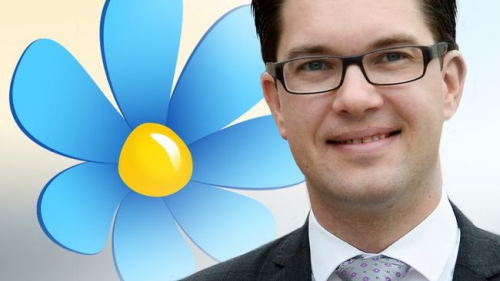

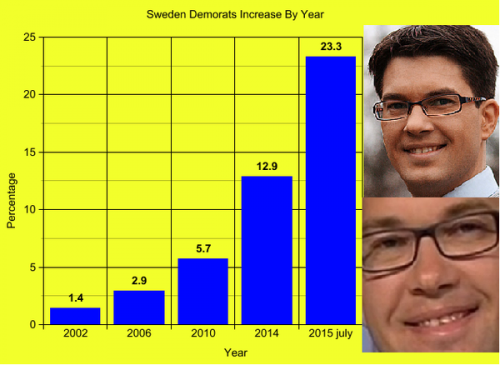

 del.icio.us
del.icio.us
 Digg
Digg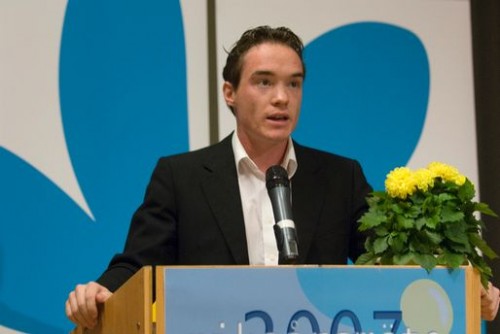
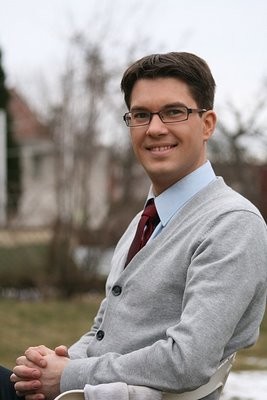 En Allemagne, il n’était guère connu : Per Jimmie Akesson est le nom d’un homme jeune, de 31 ans, qui est le président des « démocrates suédois » (SD). En septembre 2010, son parti a obtenu le score de 5,7% et a réussi ainsi une percée politique. Dès l’âge de dix-neuf ans, ce diplômé de sciences politiques siégeait au conseil municipal de Sölvesborg. Douze ans après ce premier et modeste mandat politique, il est devenu le chef d’un parti conservateur de droite qui s’oppose à l’islamisation du pays et s’insurge contre le prix exorbitant que coûte l’expérience multiculturelle en Suède. Et il a mené cette formation politique à siéger au Parlement de Stockholm.
En Allemagne, il n’était guère connu : Per Jimmie Akesson est le nom d’un homme jeune, de 31 ans, qui est le président des « démocrates suédois » (SD). En septembre 2010, son parti a obtenu le score de 5,7% et a réussi ainsi une percée politique. Dès l’âge de dix-neuf ans, ce diplômé de sciences politiques siégeait au conseil municipal de Sölvesborg. Douze ans après ce premier et modeste mandat politique, il est devenu le chef d’un parti conservateur de droite qui s’oppose à l’islamisation du pays et s’insurge contre le prix exorbitant que coûte l’expérience multiculturelle en Suède. Et il a mené cette formation politique à siéger au Parlement de Stockholm. 
 Sweden’s ruling centre-right coalition won the most votes but fell short of a majority in the general election as the far right entered parliament for the first time.
Sweden’s ruling centre-right coalition won the most votes but fell short of a majority in the general election as the far right entered parliament for the first time.